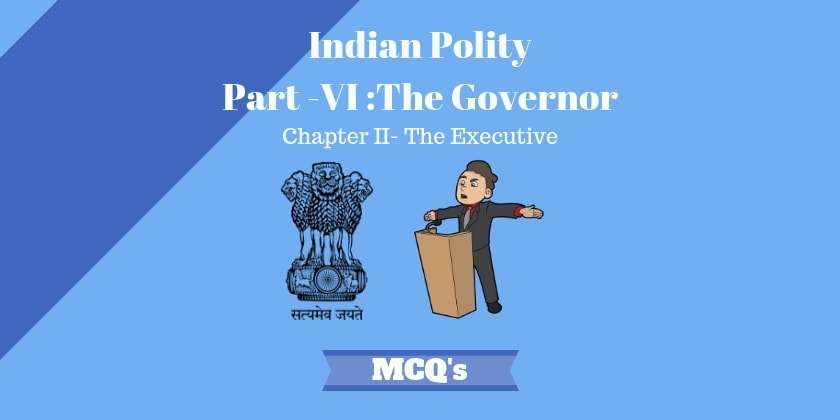Indian constitution part-VI the state chapter II The Governor and its power
Chapter II- The Executive
PART VI of the Constitution deals with the state of India. Under Part VI Chapter I deals with the definition of the state, here we discuss chapter II The Governor and its power.
The states and union territories of India have similar powers and functions at the state level as that of the President of India at Union level. Governors exist in the states while lieutenant-governors exist in union territories and in the National Capital Territory of Delhi.
Qualifications of the Governor:
Article 157 and Article 158 of the Constitution of India specify eligibility requirements for the post of governor.
1. He/she must be a citizen of India.
2. Must be at least 35 years of age(similar like President in a union).
3. He/She is not a member of either house of the parliament or house of the state legislature.
4. He/She does not hold any office of profit.
Powers and functions of the Governor:
The primary function of the governor is to preserve, protect and defend the constitution and law as an oath of office under article 159 of Indian Constitution in the administration of the state.
- Executive Power: Executive power related to administration, appointments, and removals.
- Legislative Power: Legislative power related to lawmaking and the state legislature, that is Vidhan Sabha or Vidhan Parishad.
- Discretionary Power: Discretionary power to be carried out according to the discretion of the governor.
Tenure of the Governor:
- The governor’s office usually has a term of 5 years, but it can be terminated before it.
- Dismissal by the President usually on the advice of the Prime Minister of the country under whose rule is the post of governor. Without a valid reason, the governors are not allowed to terminate.
- Resignation by the governor.
Important articles under the governor of the state:
1. Article 153: Governors of State.
2. Article 154: Executive Power of State
3. Article 155: Appointment of Governor
4. Article 156: Term of office of Governor
5. Article 157: Qualifications for Appointment as Governor
6. Article 158: Conditions of Governor’s office
7. Article 159: Oath or affirmation by the Governor
8. Article 160: Discharge of the functions of the Governor in certain contingencies.
9. Article 161: Power of Governor to grant pardons, etC.
10. Article 162: Extent of executive power of State
Part VI- The Governor and its power MCQ’s
1. Which one of the following article deals with the Governor of States?
A. Article 150
B. Article 153
C. Article 165
D. Article 167
[toggle] Answer – B [/toggle]
2. The rules and guidelines laid down in the Part VI of the Constitution are NOT applicable to which state?
A. Telangana
B. Chattisgarh
C. Jammu & Kashmir
D. Manipur
[toggle] Answer – C
Explanation: Jammu & Kashmir has a Constitution of its own. Article 370 in Part XXI of the Constitution grants it a special status. [/toggle]
3. Who among the following administers the oath of office to the Governor?
A. Chief Minister
B. President
C. Chief Justice of India
D. Chief Justice of concerned State High Court
[toggle] Answer – D[/toggle]
4. Consider the following statements.
1) Art. 157 lays down two qualifications for the office of the Governor.
2) The governor’s should be a member of the state legislature.
3) Governor should have completed the age of 40 years before the appointment.
Which of the statement given above is / are correct.
A. 1 only
B. 2 & 3 only
C. 1 & 3 only
D. 1, 2 & 3 only
[toggle] Answer – A [/toggle]
5. In a real sense, the Governor of the State is appointed by the President on the advice of the following…….
A. Prime Minister
B. Chief Minister
C. Vice-President
D. Chief Justice
[toggle] Answer – A [/toggle]
6. The Governor of the State can be removed by which one of the following?
A. Chief Minister
B. Prime Minister
C. Union Home Minister
D. President
[toggle] Answer – D[/toggle]
7. Which of the following are the discretionary powers of the Governor?
A. Selection of Chief Minister
B. Provide advice to the President regarding President’s rule in the concerned state.
C. Returning back the bill to the State legislature for reconsideration.
D. All the above
[toggle] Answer – D[/toggle]
8. who among of the followings are appointed by the Governor?
A. Advocate General
B. Chief secretary of the State
C. Vice-chancellors of universities
D. All the above
[toggle] Answer – D[/toggle]
9. To remove the Governor from the post, the President wants to seek advice from:
A. Council of Ministers
B. Supreme Court
C. Chief Minister of the concerned state
D. None of them
[toggle] Answer – D
Explanation: The Governor is an agent of the President who holds the office during the pleasure of the President. So, to remove him / her from office, the president does not need to seek advice from anybody.[/toggle]
10. Who is the chief executive head of the state?
A. Chief minister
B. Governor
C. Presidnet
D. None of the above
[toggle] Answer – B [/toggle]

